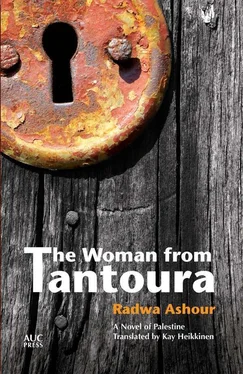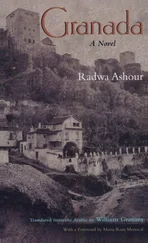I see Hasan’s tears, and I hear the woman next to me trill for joy.
The buses move off, taking us back. The disc of the sun is gradually falling into the sea, which we smell though it’s hidden from view. Silence enfolds us; I think, the holiday is over, in the blink of an eye. Everyone is going back to where he came from. Strange! It’s as if we were returning from a long trip. The silence is broken by a strong voice, belonging to a young man sitting on the left, in front, and singing a song of Fairuz:
Back from far deserts, by tents of their own,
The night fires are happy, and shadows are thrown.
There’s none to tell them of a wound deep as bone.
The tents move on, and I’m left alone, alone,
Yabaa oof, yabaa oof, aoof.
Where does a young man get all this sadness, from what deep well does he raise it? Who … the thought remains incomplete. The voice is possessed by the end of the mournful mawwal, rising and leaping as if to the sky above. Or as if a demon had possessed him, from among the dabka dancers who shake the earth with the stamp of their feet. The young men join in the singing:
Strike the mortars, grind coffee for the guests,
Strike the mortars, and let the south wind blow,
My love will hear the pounding of the pestles.
The black wind rises, strike the mortars now.
Once again the solo voice rose alone:
Take down the tents, the bird has flown away,
The tents’ winds call: let us be on our way!
The black wind rises, strike the mortars now.
At the edge of the night the wolf sends forth his cry,
The night breeze carries our complaints far and wide.
The black wind rises, strike the mortars now.
The others answer the singer:
Al-lala, we-lala, al-lala, we-lala, we-lala
al-lala, we-lala, we-lala.
I close my eyes, following the colorings of the voice:
The noonday sun starts to sink, O my love, my desire,
They have gone to the heights, gone west in the moonlight,
While I sit alone, waiting for them by night,
Waiting by night.
I look down on the valley, and say to the sun, flee,
I fear your light will burn, so my love won’t know me.
I watch from the trees, forcing open my eyes,
Afraid to sleep lest you leave me, and forget where I lie.
Was I fighting off sleep, or falling into it without realizing? Did I doze off? Did I see him in a dream, or was the boy sitting beside me and looking up at me? Can a person see what’s around him with his eyes closed? The young man was still singing; the solo voice went back to the sadness of the mawwal, nearing the end:
They took my love and went north, far away,
Oh woe, oh woe, oh woe be the day!
They took my love and went north, far away.
Where did the woman go who was sitting next to me? When did this boy sit down in her place? He was looking up at me, with his eyes wide. I noticed, and looked at him. He opened a large drawing pad, and said, “I wanted to show you your picture.”
“A picture of me?”
“I drew it while we were there.”
“Are you an artist?”
“I draw. I’m still in the second year of middle school.” He fell silent, then continued, “I also work.”
“What do you do?”
“I pick oranges in season, and I pick olives in season. I help builders sometimes, and sometimes I sell cakes on the sidewalk.”
“You help your parents?”
“I could help them more. I give them some of what I earn; I need some of the money to buy drawing pads. They’re expensive. I don’t draw with colors, I draw in charcoal and black ink. Charcoal pencils aren’t cheap, and ink is also expensive.
“Sometimes I give in and buy a piece or two of chocolate, and divide them with my brothers and sisters. I crave it, so I tell myself that it’s not really wrong to do what you want, sometimes. What do you think?”
I smile, and say, “It’s completely reasonable.”
He opened the pad. In the drawing there was barbed wire and a crowd of people on both sides. At the front was a woman wearing a long peasant dress lifting her hands high, holding an infant in diapers that she was about to give to a young man on the other side of the wire, who was lifting his hands toward the infant. On the child’s chest was a large, old key, covering a third of her body. The people on both sides of the wire were all tall, lofty lines, each leaning slightly toward the other side, as if they met in a trellis that nearly made an arch.
He turned the page. “This is another drawing I made of you now, while you were sleeping.”
A few lines of charcoal summon the likeness. The tattoo under the nose is clear, as if the Gypsy woman had made it a day or two earlier. The hair fastened behind the head had become two plaits, in the picture. Here also, the boy had put me in a long peasant dress. I said, “Why did you draw me twice in a peasant dress, and why do I have two braids?”
He shrugged his shoulders. “I don’t know, that’s how I saw you.”
“You didn’t tell me your name.”
“Naji.”
“Where are you from, Naji?”
“From Ain al-Helwa.”
“I know, but where are you from originally?”
“From Upper Galilee.”
I heard someone say, “We’ve arrived.” I opened my eyes; the bus was stopping and the passengers had started to get out. I got off and took leave of Karima’s sisters, and of the people I had met on the trip, promising we would get together again soon. I stopped a taxi and it took me home.
In bed, between sleep and waking, I became confused. I thought, was Naji sitting beside me, or was it a vision in a dream? Would I find him the next morning in Ain al-Helwa? Would we meet and would he allow me to get to know him better, and to watch him day after day, as he grew up? Would Naji meet little Ruqayya, one day, across the wire, or without it?
I will sleep. The eventful day has exhausted me.
I will sleep so I can get up early and go to the camp, to look for Naji and make sure that he’s there.
Tantoura, Qisarya, Saffurya, Ain Ghazal, Balad al-Sheikh, and the other villages and cities mentioned in this novel are real and can be found on any map. They are part of Palestine and its history.
The massacres depicted in the novel are documented events: the massacres of Tantoura, of Sabra and Shatila, of the shelter in the children’s school in Sidon, of the Jad Building, and others.
With the exception of some historical figures and some proper names mentioned in the text, all the characters of the novel, with their careers, their relationships and their fates, are fictional.
Abd al-Qadir al-Husayni: a Palestinian nationalist leader and the founder of an organization that fought during the Arab Revolt, 1936–39, and in the war of 1948.
Abu, Umm: Father (of), Mother (of), usually followed by the name of a first-born son; the use of this form of a name shows respect as well as some familiarity or affection.
Abu Ammar: Yassir Arafat (1929–2004), chairman of the Palestine Liberation Organization (PLO).
Amal: A movement representing the Shia in Lebanon, founded in 1974.
ataba and ooof songs, ahazij, mhaha, mawwal: Various specific forms of popular Palestinian songs.
al-Azhar Mosque: A mosque in Cairo, with a university as an integral part of the institution since its establishment in the tenth century; the university has long been considered the foremost institution for the study of Islam.
baccalaureate: The examination administered and degree awarded at the end of secondary study.
Читать дальше












